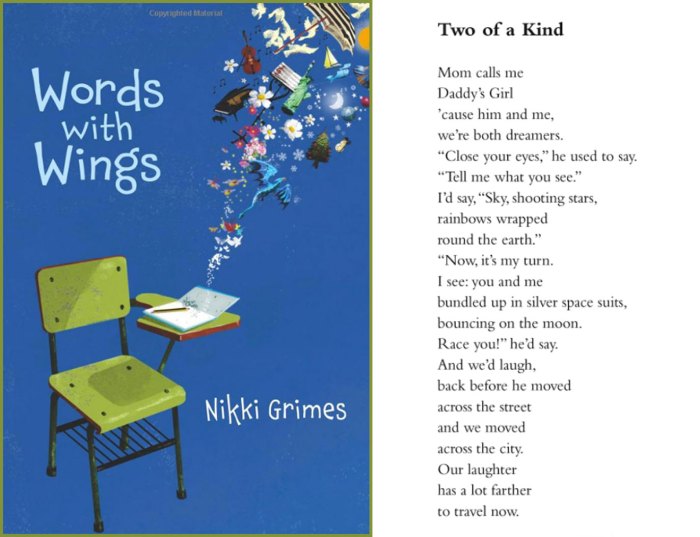Truth poem by nikki grimes – In Nikki Grimes’ profound “Truth Poem,” we embark on an introspective odyssey that explores the multifaceted nature of truth. Through the lens of a speaker’s evolving understanding, Grimes invites us to question our own perceptions and grapple with the significance of authenticity.
The poem’s journey unfolds as the speaker navigates a labyrinth of emotions, seeking to unravel the elusive essence of truth. Along the way, Grimes employs a rich tapestry of literary devices, painting vivid imagery and weaving metaphors that illuminate the speaker’s inner struggles.
About the Poem “Truth” by Nikki Grimes

Nikki Grimes’ “Truth” is a powerful and thought-provoking poem that explores the complex nature of truth and its elusive nature.
Central Theme
The central theme of the poem is that truth is multifaceted, subjective, and often difficult to grasp. Grimes uses vivid imagery and metaphors to convey the idea that truth is not a static entity but rather a fluid concept that can change depending on one’s perspective and experiences.
Literary Devices
Grimes employs various literary devices to enhance the poem’s meaning and impact. Metaphors, such as “truth is a river” and “truth is a chameleon,” emphasize the fluidity and elusive nature of truth. Similes, like “truth is like a mirror” and “truth is like a shadow,” highlight the reflective and elusive qualities of truth.
Structure
The poem’s structure is deliberate and contributes to its overall meaning. The poem is divided into three stanzas, each of which explores a different aspect of truth. The first stanza introduces the central theme, while the second stanza delves into the subjective and elusive nature of truth.
The final stanza concludes the poem by emphasizing the importance of seeking truth and embracing its complexity.
The Speaker’s Journey

The speaker in Nikki Grimes’ poem “Truth” embarks on a profound emotional and intellectual journey as they grapple with the elusive nature of truth.
Initially, the speaker is filled with uncertainty and confusion, questioning the reliability of their own perceptions and the validity of the information they have been taught. They express a deep yearning for clarity and a desire to uncover the truth that lies beyond the superficial.
The Evolution of the Speaker’s Understanding of Truth
As the poem progresses, the speaker’s understanding of truth undergoes a significant evolution. They come to realize that truth is not always absolute or easily accessible, but rather a complex and multifaceted concept that can be approached from multiple perspectives.
The speaker also recognizes the importance of personal experience and subjective interpretation in shaping one’s perception of truth. They learn to value their own experiences and insights, while also remaining open to the perspectives of others.
Challenges and Obstacles in the Search for Truth
The speaker’s journey is not without its challenges and obstacles. They encounter skepticism, doubt, and even opposition from those who are resistant to questioning established beliefs or challenging the status quo.
The speaker also faces the challenge of reconciling their own beliefs and values with the truths that they uncover. This process can be both exhilarating and unsettling, as it forces them to confront their own biases and assumptions.
The Importance of Truth
In her poem “Truth,” Nikki Grimes delves into the profound significance of truth in our lives. Grimes explores the consequences of ignoring or distorting the truth and emphasizes the importance of seeking and embracing it.
Consequences of Ignoring or Distorting the Truth, Truth poem by nikki grimes
Grimes illustrates that ignoring or distorting the truth can lead to devastating consequences. When we deny the truth, we create a false reality that can damage our relationships, hinder our growth, and ultimately erode our integrity. The poem warns that suppressing or altering the truth can result in:
- Broken trust and damaged relationships
- Self-deception and a distorted sense of reality
- Hindrance of personal growth and self-improvement
- Erosion of ethical values and moral integrity
Poetic Techniques: Truth Poem By Nikki Grimes

Grimes employs various poetic techniques to enhance the poem’s impact and convey her message effectively.
Figurative Language
- Metaphor:“Truth is a river” compares truth to a flowing body of water, emphasizing its fluidity and continuous nature.
- Simile:“Truth is like a fragile flower” suggests that truth is delicate and requires protection.
- Personification:“Truth can hide” attributes human-like qualities to truth, suggesting its elusive and enigmatic nature.
Rhythm and Rhyme Scheme
The poem follows a consistent iambic tetrameter, with four stressed syllables in each line. This rhythm creates a steady and purposeful pace, reinforcing the poem’s message.
The rhyme scheme (ABAB) adds a musical element, making the poem more memorable and engaging.
Nikki Grimes’ “Truth” poem eloquently captures the complexities of seeking truth. Its themes resonate deeply, much like the questions posed in Jack London’s “To Build a Fire.” Like the protagonist in London’s story, Grimes’ poem explores the treacherous path to understanding, where the answers may not always be clear . Yet, Grimes’ “Truth” ultimately reminds us that the pursuit of truth, like the search for fire in the wilderness, is an essential and enduring human endeavor.
Sensory Details and Imagery
Grimes uses vivid sensory details to evoke a tangible experience for the reader.
- Sight:“Truth is a fragile flower” conjures an image of a delicate bloom.
- Touch:“Truth can hide behind a smile” suggests the deceptive nature of truth.
- Sound:“Truth is a whisper” conveys the subtle and elusive quality of truth.
Personal Interpretation

Nikki Grimes’ “Truth” resonates deeply within me, evoking memories of my own struggles with truth and its complexities. The poem’s exploration of the often-elusive nature of truth mirrors my own experiences of grappling with the subjective and multifaceted aspects of reality.
The poem’s central metaphor of a chameleon, constantly shifting its hues to blend with its surroundings, aptly captures the elusive nature of truth. I have often found myself questioning my own perceptions, wondering if what I believe is truly objective or merely a reflection of my own experiences and biases.
Subjectivity and Perspective
Grimes’ emphasis on the subjective nature of truth aligns with my belief that our understanding of the world is inherently shaped by our individual perspectives. The poem’s lines, “Truth is a chameleon,/Changing colors with the light,” remind me that the truth we perceive is often colored by our own beliefs, values, and experiences.
This subjectivity can be both empowering and challenging. It allows us to interpret the world through our own unique lens, but it also requires us to be mindful of the potential biases and limitations of our own perspectives.
The Importance of Truth-Seeking
Despite the challenges, Grimes’ poem also highlights the importance of relentlessly pursuing truth, even when it proves elusive. The lines, “Truth is a journey,/Not a destination,” encourage us to embrace the ongoing process of questioning, seeking, and refining our understanding of the world.
This journey requires courage, humility, and a willingness to challenge our own assumptions. It is through this process that we can strive to approach a deeper and more nuanced understanding of truth, even if it remains forever out of our grasp.
Lessons and Insights
Reading Grimes’ “Truth” has left me with several profound lessons and insights. Firstly, it has reinforced the importance of recognizing the subjective nature of truth and being mindful of the potential biases in our own perspectives.
Secondly, the poem has inspired me to embrace the ongoing journey of truth-seeking, even when it proves challenging. By questioning our assumptions, engaging in critical thinking, and seeking diverse perspectives, we can strive to deepen our understanding of the world and our place within it.
Essential FAQs
What is the central theme of Nikki Grimes’ “Truth Poem”?
The central theme of “Truth Poem” is the exploration of truth, its complexities, and its profound importance in our lives.
How does the speaker’s understanding of truth evolve throughout the poem?
The speaker’s understanding of truth undergoes a significant transformation, evolving from a naive acceptance to a deeper comprehension of its multifaceted nature.
What literary devices does Grimes employ in “Truth Poem”?
Grimes utilizes a range of literary devices, including metaphors, similes, imagery, and personification, to enhance the poem’s emotional impact and convey its profound message.